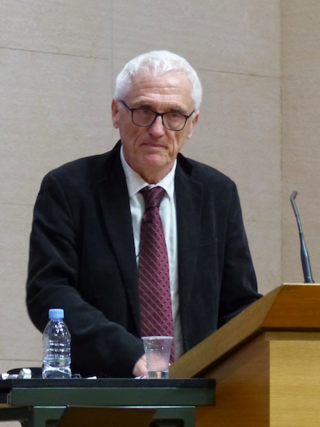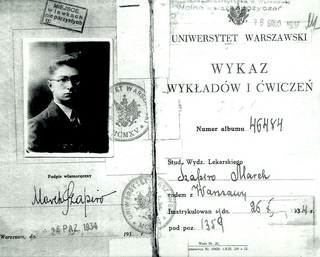
The Polish diaspora comprises Poles and people of Polish heritage or origin who live outside Poland. The Polish diaspora is also known in modern Polish as Polonia, the name for Poland in Latin and many Romance languages.
Ramos is a surname of Spanish and Portuguese origin that means "bouquets" or "branches". Notable people with the surname include:

Jan Tomasz Gross is a Polish-American sociologist and historian. He is the Norman B. Tomlinson '16 and '48 Professor of War and Society emeritus and professor of history emeritus at Princeton University.

Suárez is a common Spanish surname of Germanic origin, of which Juárez is an alternative form. It is widely spread throughout Latin America as a consequence of colonization. In origin it is a patronymic meaning "son of Suero" or "son of Soeiro". It may be derived from the Latin name Suerius, meaning "swineherd", in turn related to the Visigothic "surhari". The surname originates to the province of Asturias in northwest Spain. This surname is most commonly found in Mexico, Spain, Cuba, and Argentina.

Żydokomuna is an anti-communist and antisemitic canard, or a pejorative stereotype, suggesting that most Jews collaborated with the Soviet Union in importing communism into Poland, or that there was an exclusively Jewish conspiracy to do so. A Polish language term for "Jewish Bolshevism", or more literally "Jewish communism", Żydokomuna is related to the "Jewish world conspiracy" myth.

The University of Warsaw is a public research university in Warsaw, Poland. Established on November 19, 1816, it is the largest institution of higher learning in the country, offering 37 different fields of study as well as 100 specializations in humanities, technical, and natural sciences.

Ghetto benches was a form of official segregation in the seating of university students, introduced in 1935 at the Lwów Polytechnic. Rectors at other higher education institutions in the Second Polish Republic had adopted this form of segregation when the practice became conditionally legalized by 1937. Under the ghetto ławkowe system, Jewish university students were required under threat of expulsion to sit in a left-hand side section of the lecture halls reserved exclusively for them. This official policy of enforced segregation was often accompanied by acts of violence directed against Jewish students by members of the ONR.

Greek Uruguayans are Uruguayan residents either fully or partially of Greek descent or Greece-born people who reside in Uruguay.

Polish Argentines are Argentine citizens of full or partial Polish ancestry or Poland-born people who reside in Argentina. Poland was the fourth largest net migrants contributor after Italy, Spain and Germany. Although it is hard to give an exact number of Polish immigrants to Argentina, as those who immigrated before 1919 carried German, Austrian or Russian passports, it is estimated that between 1921 and 1976, 169,335 Poles permanently settled in the country. Today there are 2 million Argentines of Polish descent. The Polish minority in Argentina is both one of the most significant minorities in Argentina and one of the largest groups of Polish diaspora.
Nieto (“grandchild”) is a Spanish surname, Neto is the Portuguese version of the name. Notable people with the surname include:

The history of the Jews in Uruguay goes back to colonial times. In the 1700s, Jews escaping from the Inquisition arrived in the Banda Oriental, territory of present-day Uruguay. However, the most important influx of Jews to Uruguay occurred during the end of the 19th century and to a greater extent during the first half of the 20th century, especially during World War I and II.

The German community in Uruguay numbers ca. 10,000 German expatriates and 40,000 people of German descent. Most of them live in the Montevideo area, although there are German minorities in Paysandú, Río Negro, San José and Canelones.

Chil (Enrique) Meyer Rajchman a.k.a. Henryk Reichman, nom de guerre Henryk Ruminowski was one of about 70 Jewish prisoners who survived the Holocaust after participating in the August 2, 1943, revolt at the Treblinka extermination camp in Poland. He reached Warsaw, where he participated in the resistance in the city, before it was captured by the Soviet Union.

A Lithuanian Uruguayan is a Uruguayan citizen who is fully or partially of Lithuanian descent.
Ukrainian Uruguayans are an ethnic minority in Uruguay.

Camila Rajchman Goldfarb is an Uruguayan singer, songwriter and television personality. She is best known for being the vocalist of the cumbia-pop band Rombai from 2014 to 2016.













